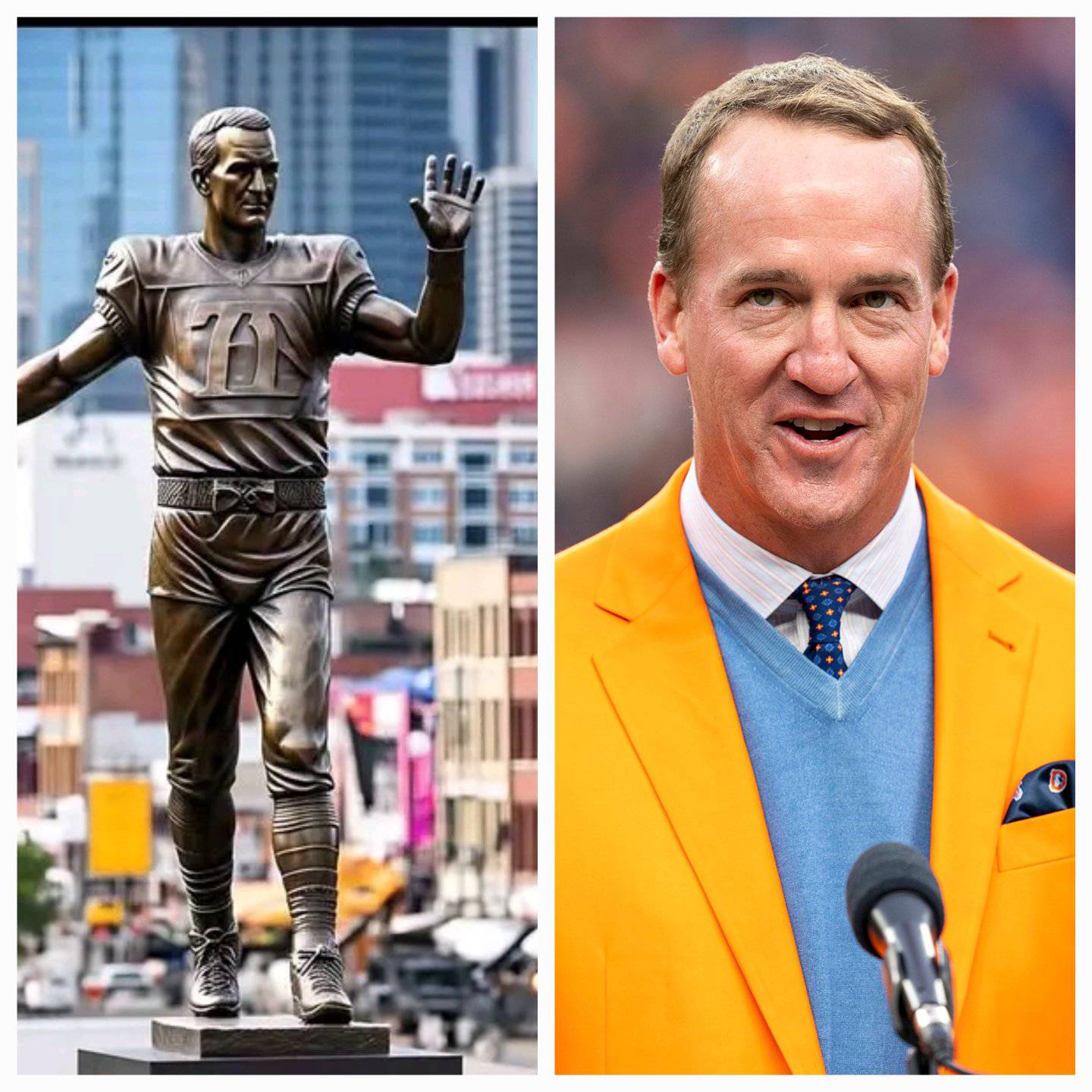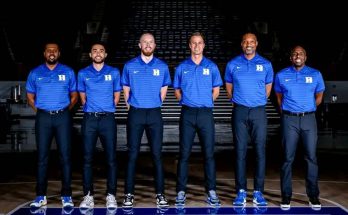The Tennessee Volunteers have long been a force in college football, a team rich with history, tradition, and a legacy that spans decades. Within this esteemed legacy, few names resonate as powerfully as that of Peyton Manning. Manning, a name synonymous with excellence both on and off the field, is not just one of the greatest quarterbacks in NFL history but also a figure whose influence and impact have left an indelible mark on the University of Tennessee and its football program. As a student-athlete, Manning set new standards of performance, discipline, and leadership that continue to inspire Vols players today. His unwavering support for the program after his departure has only deepened his connection to the university and its football family. It is therefore fitting that the University of Tennessee would honor him with a statue — a bronze representation of a legend that serves as both a tribute to his past and an inspiration for the future.
Manning’s connection to Tennessee football is as deep as it is impactful. Born in New Orleans, Louisiana, Peyton Manning was the son of Archie Manning, a former NFL quarterback himself, who played for the New Orleans Saints. While Archie Manning had achieved his own level of fame in the football world, Peyton’s future was destined to surpass even his father’s success in ways that few could have predicted. Peyton Manning’s arrival at the University of Tennessee was a pivotal moment in college football history.
In 1994, Manning arrived at Tennessee as one of the most highly-touted high school quarterbacks in the country. His decision to attend the University of Tennessee was a pivotal moment for the Volunteers, who were in the midst of rebuilding their program and establishing themselves as a perennial power in college football. Manning wasted no time in making his presence felt. As a freshman, he played in a backup role, but by his sophomore season, he became the full-time starter, a position he would hold for the next three seasons. Over the course of his college career, Manning redefined what it meant to be a quarterback. He set multiple school records and led the Volunteers to an impressive run of success, including a memorable victory over the Florida Gators in 1997 and an outstanding individual performance during his senior season. By the time Manning left Tennessee, he had firmly established himself as one of the greatest quarterbacks in college football history.
Manning’s success at Tennessee was built on a foundation of discipline, hard work, and a commitment to excellence. His work ethic became legendary, as he was known for his obsessive attention to detail and his relentless pursuit of perfection. Manning’s leadership on the field was unmatched, and he earned the respect of his teammates, coaches, and opponents alike. His ability to read defenses, his accuracy as a passer, and his poise in the pocket were all attributes that made him one of the most complete quarterbacks to ever play the game.
But it wasn’t just Manning’s on-field performance that set him apart. His dedication to his team and his university was equally as impressive. He was the epitome of what it meant to be a Tennessee Volunteer. Manning embraced the responsibility of being the face of the program, and he did so with grace, humility, and unwavering commitment. He understood the significance of representing Tennessee, and he took that responsibility seriously. For Manning, playing at Tennessee wasn’t just about personal success — it was about lifting up the program and making it better. He was the consummate teammate, always putting the needs of the team ahead of his own.
Manning’s time at Tennessee culminated in a senior season in 1997 in which he set several records and earned numerous accolades. He finished his college career with 11,201 passing yards, 89 touchdowns, and a legacy that would transcend the college football world. Although Manning and the Volunteers did not win a national championship during his time in Knoxville — an accomplishment that would later come for the program in 1998 — his individual excellence was undeniable.
Manning’s decision to leave Tennessee after his senior season and declare for the NFL Draft was not an easy one. He had become a beloved figure in Knoxville, and his departure marked the end of an era for Tennessee football. However, Manning’s impact on the program did not end with his graduation. He would go on to achieve legendary status in the NFL, playing for the Indianapolis Colts and the Denver Broncos, winning two Super Bowl titles and earning five MVP awards along the way. His success in the NFL further elevated his stature as one of the greatest quarterbacks of all time. Despite his professional success, Manning never forgot where he came from.
Throughout his NFL career, Manning remained a staunch supporter of the University of Tennessee and its football program. He frequently returned to Knoxville for games, events, and charity work, always staying connected to the Vols. His loyalty to the university was unwavering, and his support for the program extended far beyond his playing days. In 2005, he made a significant contribution to the university, donating millions of dollars to support Tennessee’s football program and other athletic initiatives. His involvement with the university remained strong, even as his professional career reached new heights. He regularly attended the annual spring game, where his presence was celebrated by fans and players alike.
Peyton Manning’s dedication to Tennessee was not just a matter of donating money or attending events. He embodied the values of the university and its football program in everything he did. He continued to serve as a role model for current and future generations of Tennessee football players. He exemplified what it meant to be a Tennessee Volunteer — someone who was committed to excellence, dedicated to his team, and proud of his university.
In 2025, the University of Tennessee took a momentous step to honor Manning’s legacy in a way that was both fitting and symbolic. The university unveiled a bronze statue of Peyton Manning outside Neyland Stadium, the home of Tennessee football. This statue serves as a permanent reminder of Manning’s impact on the program and the university as a whole. It is a tribute to the player who helped elevate Tennessee football to new heights and inspired countless individuals with his work ethic, leadership, and commitment to excellence.
The statue itself is a stunning representation of Manning in his Tennessee uniform, mid-throw, captured in a moment of athletic grace. The sculpture was meticulously crafted, capturing the essence of Manning’s poise and determination. The likeness of Manning, complete with his signature number 16 jersey, stands tall as a symbol of the greatness that he achieved during his time at Tennessee. It is an image that will forever be associated with the university and its football program, reminding future generations of the legacy that Manning left behind.
For Tennessee fans, the statue represents more than just a physical tribute to a legendary athlete. It is a celebration of a time when the Volunteers were among the elite teams in college football, a time when Manning’s leadership and performance on the field were the cornerstone of the program’s success. The statue serves as a reminder of the pride and joy that Manning brought to the university, and it stands as a beacon of hope for future generations of Tennessee football players who will strive to emulate the same level of excellence that Manning set during his time in Knoxville.
The unveiling of the statue was a moment of reflection for the Tennessee football community. It was an opportunity to look back on the incredible journey that Manning had taken, from a highly-touted high school prospect to one of the greatest quarterbacks in the history of the NFL. It was also a time to look forward, to consider the future of the Tennessee football program and the values that Manning helped instill in it.
Manning’s impact on the University of Tennessee football program is undeniable. He is a symbol of excellence, leadership, and commitment to the university. His legacy will continue to inspire future generations of players, coaches, and fans, and the statue that now stands outside Neyland Stadium serves as a permanent reminder of the indelible mark that Peyton Manning has left on Tennessee football. His story is one of hard work, dedication, and unwavering support for the program, and it is a story that will continue to resonate for years to come. The bronze statue is more than just a tribute to a legendary player; it is a testament to the enduring impact of Peyton Manning’s legacy on the University of Tennessee and its football program.



